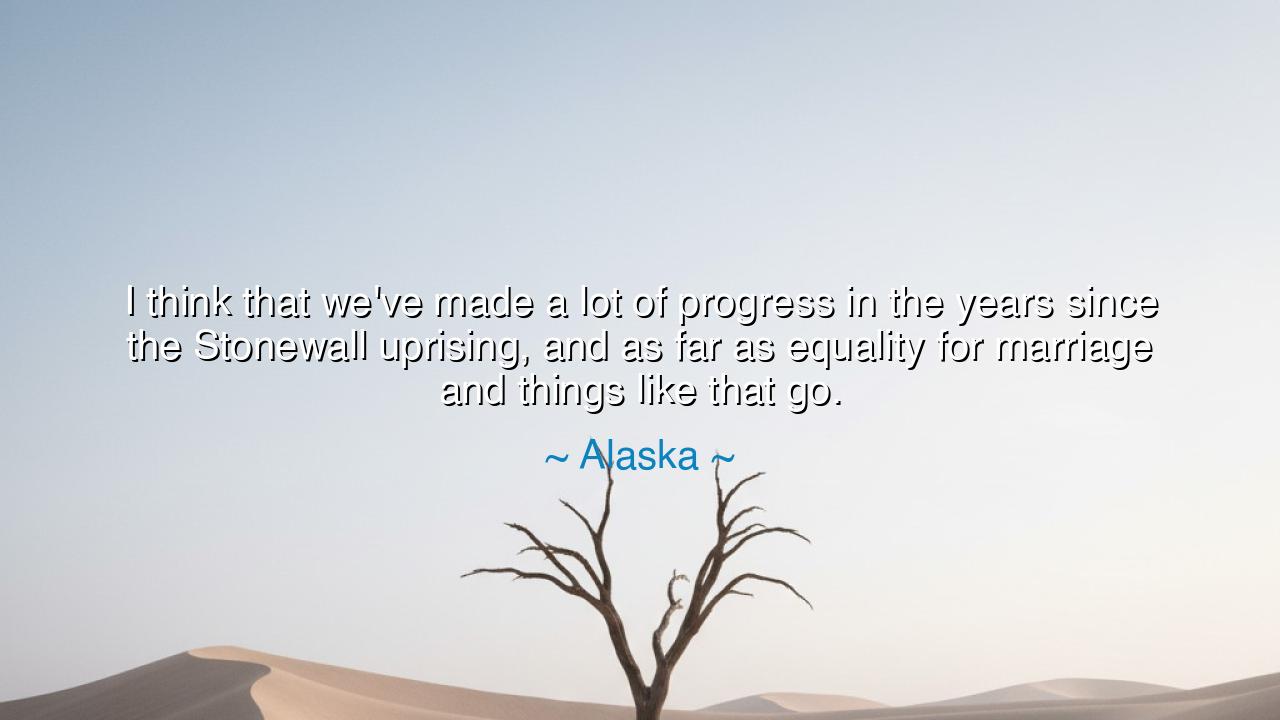
I think that we've made a lot of progress in the years since the
I think that we've made a lot of progress in the years since the Stonewall uprising, and as far as equality for marriage and things like that go.






In the vast history of human struggle, few stories are more poignant or powerful than the fight for equality. The words of Alaska resonate with the heart of this ongoing journey: “I think that we've made a lot of progress in the years since the Stonewall uprising, and as far as equality for marriage and things like that go.” These words carry within them the weight of history, the promise of change, and the relentless pursuit of justice. The Stonewall Uprising, which took place in 1969, marked a pivotal moment in the LGBTQ+ rights movement, where those who had long been marginalized began to rise, demanding not just acceptance but equality—a right to live and love freely, without fear or shame.
The ancients were no strangers to the tension between freedom and oppression. In ancient Greece, Socrates advocated for a life lived in pursuit of truth and virtue, even when the society around him sought to silence his voice. He understood that equality was not a mere political ideal but a fundamental right of every person. Yet, even in Athens, the notion of equality was limited, as women, slaves, and non-citizens were excluded from the rights and privileges that Socrates championed. In this sense, the struggle for equality—and the demand for justice for those on the margins of society—has always been at the heart of the human experience. Alaska’s reflection speaks to the progress made, but it also invites us to remember that justice is an ongoing pursuit.
In many ways, Stonewall was a rebirth, a spark of rebellion that ignited the flame of the LGBTQ+ rights movement. The Stonewall Uprising was not merely an act of defiance, but a declaration that those who had been hidden, silenced, and oppressed were no longer willing to live in fear. The ancient story of Prometheus, who defied the gods to bring fire to humanity, is a fitting metaphor for the bravery shown during Stonewall. Just as Prometheus gave humanity the gift of fire, the individuals at Stonewall gave the world the gift of visibility and empowerment. Their courage in the face of persecution led to the flourishing of a movement that, though it faced countless obstacles, has now led to monumental progress, especially in the realm of marriage equality.
The progress spoken of by Alaska is not merely a political victory, but a societal shift that reflects a deeper transformation in how we view love and justice. When marriage equality was achieved in many parts of the world, it represented more than just the legalization of same-sex marriage—it symbolized the acceptance of love in all its forms. The ancient wisdom of Aristotle comes to mind, who believed that true justice required not just the law, but a deep understanding of the common good—the idea that the flourishing of one is tied to the flourishing of all. To deny someone the right to love freely is to deny their very humanity, their right to pursue happiness and dignity. The victory of marriage equality in many places is a step toward a world where freedom and love are not defined by gender or sexual orientation but by the strength of the bond between two people.
The Stonewall Uprising was but the beginning of a long road, one that required the courage of countless individuals who would not rest until the right to love freely was recognized and celebrated. Consider the life of Harvey Milk, the first openly gay elected official in California. Milk’s journey was not an easy one—his life was tragically cut short by assassination, but his legacy lived on, symbolizing the power of visibility and voice. Milk understood that change was not simply a matter of winning legal battles—it was about changing hearts and minds. His call to action, “You gotta give ‘em hope,” speaks to the truth that equality is not just about laws, but about creating a culture where every person is valued, loved, and respected.
The lesson we learn from Alaska’s words and from the struggles of those who came before us is one of hope and perseverance. While much has been accomplished, the journey is far from over. Equality is not a destination but a continuous journey, one that requires constant effort, courage, and action. It is easy to become complacent when progress is made, but we must remember that there are still many who are denied the rights and dignity of equality. Stonewall taught us that change is possible when we stand together, when we speak out against injustice, and when we refuse to let the forces of oppression silence our voices.
As we walk our own paths in life, let us remember the courage of those who fought for LGBTQ+ rights, and let us carry their spirit forward. We must not rest until equality is not just a dream but a reality for everyone, regardless of their identity. Alaska’s words remind us that the journey toward justice is long, but the progress made so far is a beacon of hope for future generations. Let us work to ensure that every individual has the freedom to love, to live, and to be recognized for who they are. In this way, we honor the struggles of the past and build a world where equality is not a matter of progress, but a matter of truth—the truth that every person deserves the right to live freely and love openly.






AAdministratorAdministrator
Welcome, honored guests. Please leave a comment, we will respond soon